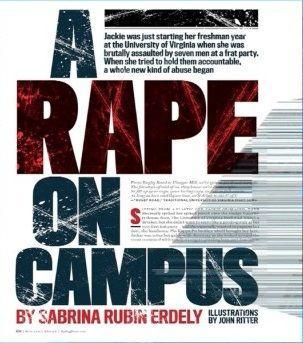Despite the real problem of sexual assault on college campuses, the most recent and poignant flashpoint for it all has turned out to be a sham. I’m talking about the Rolling Stone article that got the entire country into a frenetic fever about fraternity gang rape at a party at the University of Virginia’s Phi Kappa Psi chapter.
Two weeks ago, the Columbia School of Journalism published its report condemning the Rolling Stone article for a gross misstep in journalistic integrity and not completing “basic, even routine journalistic practice.”
The biggest screw-up is with the focus of the story, the source known as Jackie, who spun a lie so elaborate she fooled the author and editors of the smoldering remains of what’s left of Rolling Stone.
The part of the the story that made it so impactful was that Jackie hadn’t had a single sip of alcohol at the alleged frat party. Anybody who parties with the bros knows they drink like nobody’s business, and so does everyone else involved.
Alcohol is massively on college campuses, despite it being illegal for most students to possess. It’s no surprise alcohol fuels sexual assault on campuses.
A 2002 analysis of booze-based sexual assault research concluded that consumption by the aggressor, victim or both increases the likelihood of sexual assault, with at least half of college sexual assaults involving alcohol of some kind. In one study, 97 percent of alcohol-related sexual assaults involved both aggressors and victims drinking.
If you follow the current vein of feminist thought on consent, then every single sexual encounter involving alcohol ought to be classified as rape. I encountered this at a seminar from University Section Head for Philosophy James Rocha, who took up the feminist position.
The logic is pretty sound: Anybody who drinks knows that they aren’t completely competent when they’ve had a few. If you define consent as agreeing while being free, informed and competent, then you’ve got a cocktail for rape.
What threw me, and a few other people at the seminar, for a loop was that a great deal of sex we probably wouldn’t think twice about would fall under the definition of rape. For example, two trashed freshmen in Tigerland going back to a dorm and flopping around on top of each other is no longer just a drunken mishap — it has created two rape victims.
I’m really hesitant to accept this, not because I think that drunk sex is a wonderful thing, but because it drastically changes what we think of as rape.
Rape has always been this big monster of a crime, comparable to torture or murder in some people’s minds. It seems like classifying a lot more things as rape diminishes the struggles of what we traditionally think of as rape victims.
I’ll give another example from the seminar: One of the three conditions for consent Rocha advanced was that it must be informed. What this means is you can’t lie to or withhold information from somebody to have sex with them. It would be rape if the person wouldn’t have had sex with you had you not told them something about yourself they found relevant.
It sounds reasonable enough. I should probably tell somebody if I’m into hardcore BDSM before taking them back to my dungeon to make sure they’re OK with it.
More controversially, however, this would extend to guys who don’t tell the person they’re hitting on that they have a small penis and girls who don’t tell people they have a wide vagina. In addition, this applies to those people who don’t disclose that they’re virgins, terrible at cunnilingus or any number of other things.
That is, if I’ve got a small penis, and I don’t mention that to you before we get into things, assuming you wouldn’t have had sex with me had you known, I’ve just raped you.
This seems ridiculous to me. Not only that, but it’s the most non-viable standard of morality I think I’ve ever heard. Can you think of anybody in their right mind who would willingly admit their sexual inadequacies to somebody they’re trying to sleep with?
Rocha admits that this doesn’t mesh well with our current societal attitudes and mannerisms surrounding courting. What he suggests is worth thought, though.
We, meaning American society (particularly college students), have a perverse infatuation for aggressive sex with strangers or at least near strangers. You can see it in the pornography we consume, the advertisements marketed to us and especially the bars we go to. Some might even argue this stems from a biological imperative to procreate.
Maybe, just maybe, this isn’t something we should be doing. Maybe people shouldn’t go looking for aggressive, often drunk sex with strangers. That is, if you care about rape victims.
James Richards is a 20-year-old mass communication sophomore from New Orleans. You can reach him on Twitter @JayEllRichy.
Opinion: Students should reconsider perceptions of rape
April 22, 2015
More to Discover








